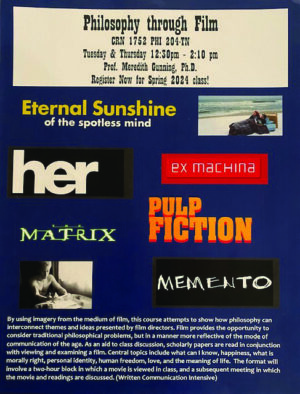
With registration for the Spring 2024 semester underway, students are in the process of selecting classes that appeal to both their chosen degrees and personal interests. One course students may want to consider is Philosophy through Film, an excellent option for those interested in either or both topics.
A flier promoting the course describes it as “[Attempting] to show how philosophy can interconnect themes and ideas presented by film directors.” Main themes often discussed in the class include human freedom, personal identity, happiness, knowledge vs illusion and the meaning of life.
The course is led by professor Meredith Gunning, Ph.D. Gunning has taught philosophy at Northern Essex for nearly 20 years, bringing her knowledge and care for the particular field of study into the classroom every day. Gunning’s evident love for philosophy is notable, possibly less notable is her love for film; that is, until the topic presents itself.
“Movies can get us thinking and feeling differently.” Gunning says, “They can deepen us.”.
According to Gunning, many of her students are accustomed to analyzing film even prior to taking this course, however, through engaging class discussions, thoughtful written responses and the reading of scholarly papers, students’ analysis skills become enhanced.
An additional takeaway skill students can gain from the course is a deeper appreciation of films. Whether you are a person who already adores watching movies or feel somewhat indifferent to them, Philosophy through Film introduces an array of lenses to perceive films through, creating a more fulfilling movie viewing experience that will hopefully stick with students even long after the course is completed.
Often, this is the case; Gunning admits it always brings a smile to her face when a past student reaches out to tell her about a new film they’ve seen and discuss their thoughts on it.
Films such as Her and Ex Machina are included within the course, both of which Gunning acknowledges with a humorless chuckle “don’t seem like sci-fi so much anymore.”, in reference to recent advancements in Artificial Intelligence and other technology.
“Films can be transformative in the way we even look at people.” Gunning says. As an example, she mentions 12 Years a Slave, a film that is not included in the course but Gunning encourages people to see anyway. Films, such as the aforementioned one, that highlight heartbreaking yet true events are beneficial because they approach real issues in a way that is more personal, and therefore impactful, than a textbook.
When asked to pick a favorite film from the course, Gunning struggled to narrow it down to just one answer. However, she quickly gushed about the previous Academy Award-winning best picture, Everything Everywhere all at Once, and the emotional impact it had on her. Gunning hopes to add this film as a part of the Philosophy through Film course, saying it would fit in well while the class discusses the meaning of life.
Students who take this class can look forward to the final film of the semester: a movie of their own choosing.
Classes in the past have chosen titles such as Shawshank Redemption and Harold and Maude.
The Philosophy through Film course is offered biennially, making this possibly the only opportunity for two-year students to experience it.
At the end of the day, Gunning says she hopes for her students to “enrich their thinking and awareness for the world around us.” after having taken her class.

